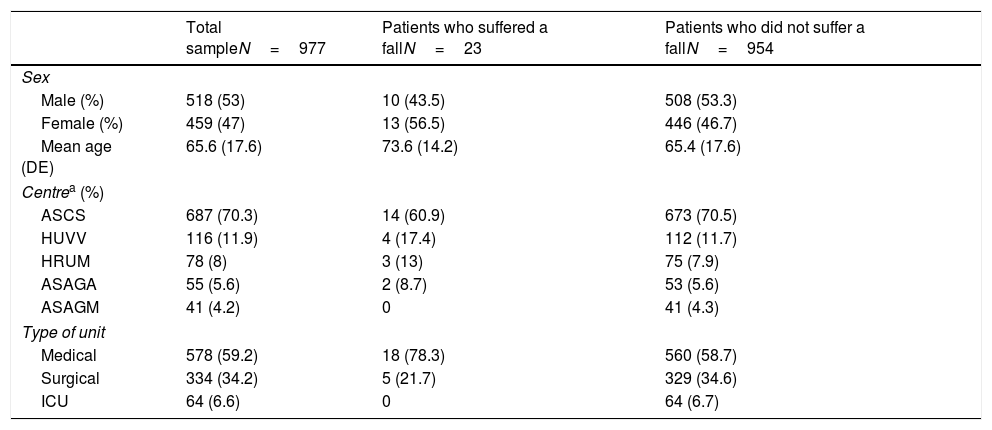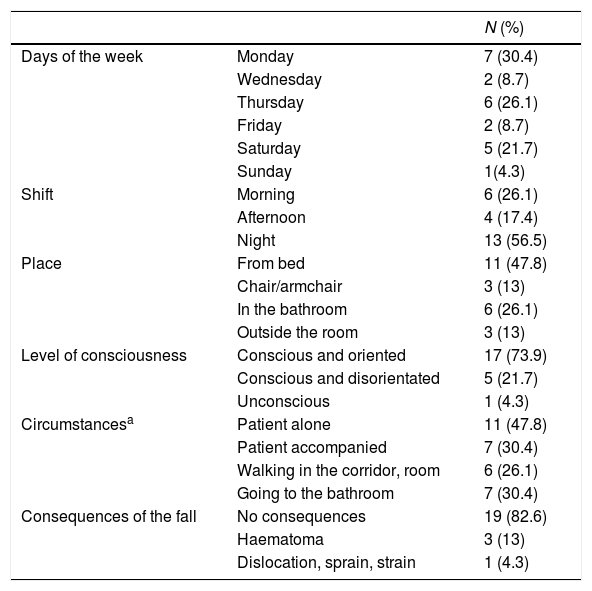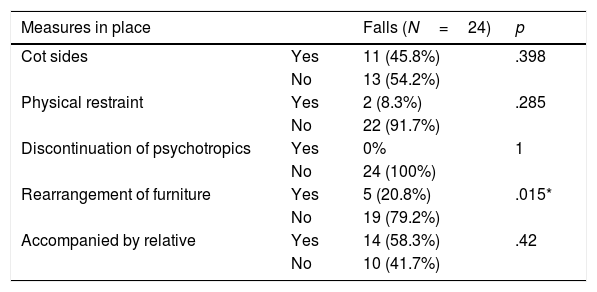To analyse the profile of patients suffering from falls in the hospital environment.
MethodLongitudinal study, prospective follow-up of a cohort of patients recruited from May 2014 to March 2016. Medical, surgical and intensive care units of 5 acute hospitals of the Community of Andalusia participated. Patients older than 16 years were included. The variables of characterization were: age, sex, unit, stay, preventive measures, and those of result: level of consciousness, sensory deficits, mobility, number of falls, circumstances and consequences, medications, previous falls.
Results1247 patients were recruited, of whom 977 completed the study. The incidence of falls was 2.35%. The average age of the faller was 73.6 years (p=.015). The event occurred mostly in women (56.5%) and in medical units (79%). The falls caused minor damage. Rearrangement of the furniture proved to be the only protective measure (OR=3.95, 95% CI 1.46–10.68, p=.015). The predictors of the event were: having been admitted to the hospital after a fall (HR=5.88, 95% CI 3.23–10.67, p<.001), followed by visual problems, frequent visits to the bathroom and having suffered previous falls.
ConclusionsThe profile of the patient suffering falls in the hospital is presented as aged over 70 years old, female, admitted to a medical unit, during the night shift, being in bed and alone, without impaired level of consciousness and with a history of falls.
Analizar el perfil de los pacientes que sufren caídas en el entorno hospitalario.
MétodoEstudio longitudinal, de seguimiento prospectivo de una cohorte de pacientes reclutada de mayo de 2014 a marzo de 2016. Participaron 5 hospitales de agudos de la Comunidad de Andalucía de unidades médicas, quirúrgicas y cuidados intensivos. Se incluyeron pacientes mayores de 16 años. Las variables de caracterización fueron: edad, sexo, unidad, estancia, medidas preventivas; y las de resultado: nivel de conciencia, déficits sensoriales, movilidad, número de caídas, circunstancias y consecuencias, medicamentos, caídas previas.
ResultadosSe reclutaron 1.247 pacientes, de los que 977 completaron el estudio.
La incidencia de caídas fue del 2,35%. La edad media de las personas que sufrieron caídas fue de 73,6 años (p=0,015). El evento aconteció sobre todo en las mujeres (56,5%) y en las unidades médicas (79%). Las caídas ocasionaron daños menores. La reordenación del mobiliario demostró ser la única medida protectora (OR=3,95; IC95% 1,46-10,68; p=0,015). Los factores predictivos del suceso fueron: haber ingresado en el hospital tras una caída (HR=5,88; IC95% 3,23-10,67; p<0,001), seguido de problemas visuales, ir al baño con frecuencia y haber sufrido caídas previas.
ConclusionesEl perfil del paciente que sufre caídas en el hospital se presenta como mayor de 70 años, mujer, ingresada en una unidad médica, durante el turno de noche, estando en cama y solo, sin deterioro del nivel de conciencia y con antecedentes de caídas.
Artículo
Comprando el artículo el PDF del mismo podrá ser descargado
Precio 19,34 €
Comprar ahora










